Mercedes EQE vs VW ID.5 – Which model is better for everyday use?
Everyday use, family trips or long-distance drives – here’s where the differences show.
Discover whether Mercedes EQE or VW ID.5 fits your lifestyle better.
Costs and Efficiency:
Price and efficiency are key factors when choosing a car – and this is often where the real differences emerge.
VW ID.5 has a decisively advantage in terms of price – it starts at 36800 £, while the Mercedes EQE costs 57600 £. That’s a price difference of around 20757 £.
In terms of energy consumption, the advantage goes to the VW ID.5: with 15.70 kWh per 100 km, it’s minimal more efficient than the Mercedes EQE with 15.80 kWh. That’s a difference of about 0.10 kWh.
As for range, the Mercedes EQE performs a bit better – achieving up to 691 km, about 132 km more than the VW ID.5.
Engine and Performance:
Under the bonnet, it becomes clear which model is tuned for sportiness and which one takes the lead when you hit the accelerator.
When it comes to engine power, the Mercedes EQE has a clearly edge – offering 625 HP compared to 340 HP. That’s roughly 285 HP more horsepower.
In acceleration from 0 to 100 km/h, the Mercedes EQE is clearly quicker – completing the sprint in 3.50 s, while the VW ID.5 takes 5.40 s. That’s about 1.90 s faster.
In terms of top speed, the Mercedes EQE performs slightly better – reaching 220 km/h, while the VW ID.5 tops out at 180 km/h. The difference is around 40 km/h.
There’s also a difference in torque: Mercedes EQE pulls noticeable stronger with 950 Nm compared to 679 Nm. That’s about 271 Nm difference.
Space and Everyday Use:
Whether family car or daily driver – which one offers more room, flexibility and comfort?
Both vehicles offer seating for 5 people.
In curb weight, VW ID.5 is clearly perceptible lighter – 1963 kg compared to 2375 kg. The difference is around 412 kg.
In terms of boot space, the VW ID.5 offers evident more room – 549 L compared to 430 L. That’s a difference of about 119 L.
When it comes to payload, Mercedes EQE barely noticeable takes the win – 600 kg compared to 549 kg. That’s a difference of about 51 kg.
Who wins the race?
The Mercedes EQE proves to be outperforms in nearly all aspects and therefore becomes our DriveDuel Champion!
Mercedes EQE is the better all-rounder in this comparison.
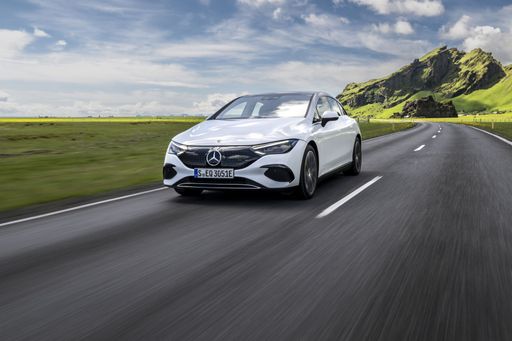
Mercedes EQE
Mercedes EQE
The Mercedes-Benz EQE epitomises the brand's commitment to luxury and electric mobility, offering a seamless blend of cutting-edge technology and elegant design. Inside, occupants are treated to a sophisticated cabin that combines high-quality materials with state-of-the-art infotainment features, ensuring a refined driving experience. On the road, the EQE impresses with its smooth, quiet ride and impressive agility, making it a standout choice for those seeking both comfort and sustainability.
details @ group-media.mercedes-benz.com
@ group-media.mercedes-benz.com
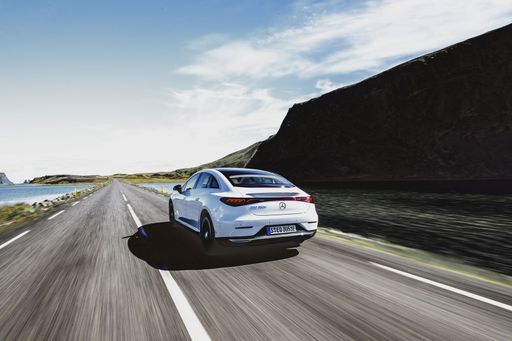 @ group-media.mercedes-benz.com
@ group-media.mercedes-benz.com
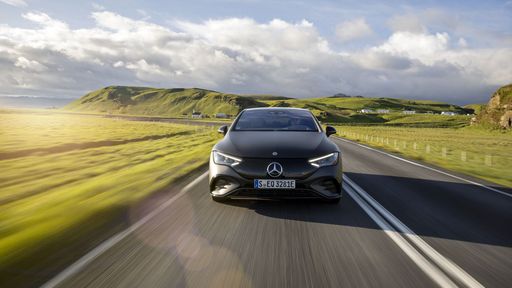 @ group-media.mercedes-benz.com
@ group-media.mercedes-benz.com
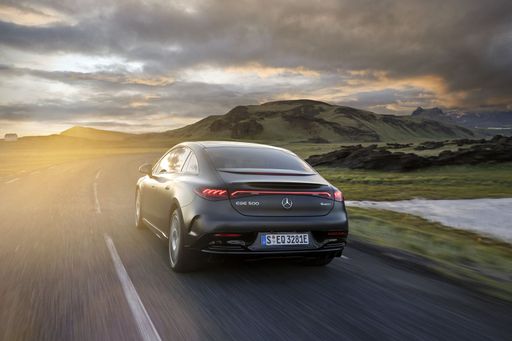 @ group-media.mercedes-benz.com
@ group-media.mercedes-benz.com
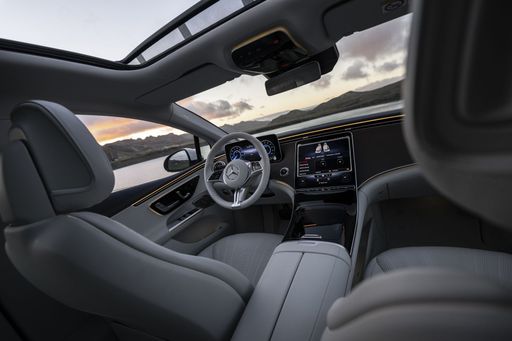 @ group-media.mercedes-benz.com
@ group-media.mercedes-benz.com
VW ID.5
The VW ID.5 is a stylish all-electric coupé SUV, designed to combine the practicality of an SUV with the sleek aesthetics of a coupé. Inside, the cabin offers a modern and spacious environment, featuring advanced technology that provides a seamless and intuitive driving experience. The ID.5 stands out with its dynamic performance and sustainable design, making it an attractive option for eco-conscious drivers.
details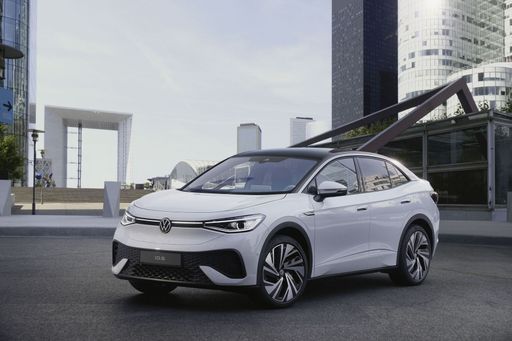 @ Volkswagen
@ Volkswagen
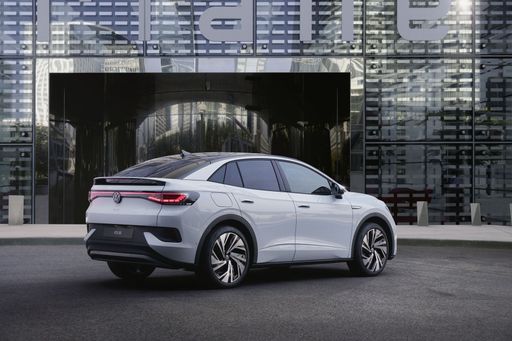 @ Volkswagen
@ Volkswagen
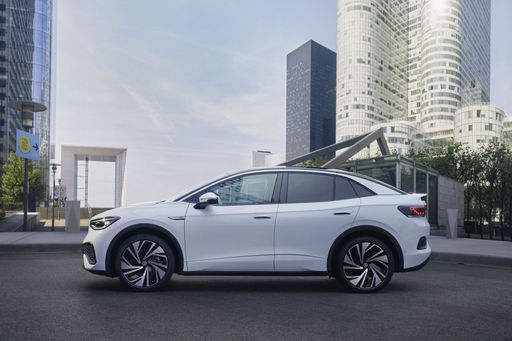 @ Volkswagen
@ Volkswagen
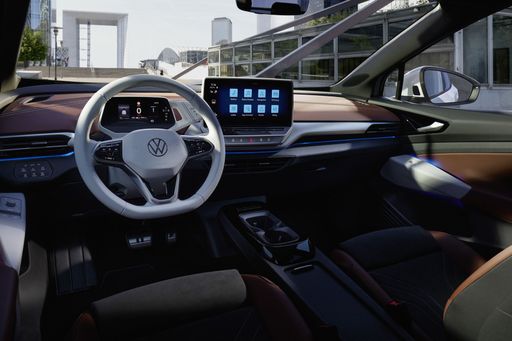 @ Volkswagen
@ Volkswagen
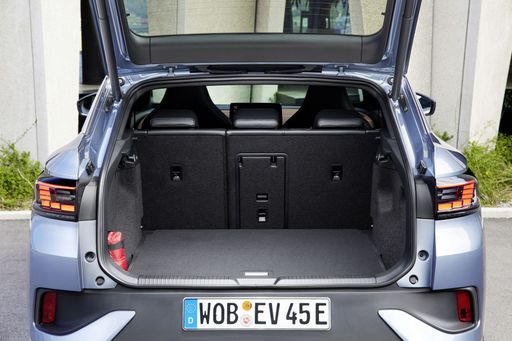 @ Volkswagen
@ Volkswagen
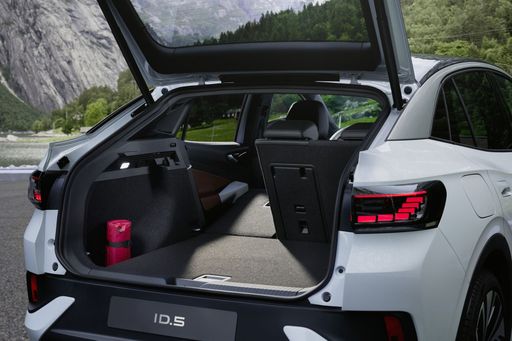 @ Volkswagen
@ Volkswagen

|

|
|
|
|
Costs and Consumption |
|
|---|---|
|
Price
57600 - 94900 £
|
Price
36800 - 48400 £
|
|
Consumption L/100km
-
|
Consumption L/100km
-
|
|
Consumption kWh/100km
15.8 - 20.7 kWh
|
Consumption kWh/100km
15.7 - 16.6 kWh
|
|
Electric Range
502 - 691 km
|
Electric Range
363 - 559 km
|
|
Battery Capacity
90.5 - 96 kWh
|
Battery Capacity
52 - 79 kWh
|
|
co2
0 g/km
|
co2
0 g/km
|
|
Fuel tank capacity
-
|
Fuel tank capacity
-
|
Dimensions and Body |
|
|---|---|
|
Body Type
Sedan
|
Body Type
SUV
|
|
Seats
5
|
Seats
5
|
|
Doors
4
|
Doors
5
|
|
Curb weight
2375 - 2540 kg
|
Curb weight
1963 - 2233 kg
|
|
Trunk capacity
430 L
|
Trunk capacity
549 L
|
|
Length
4946 - 4964 mm
|
Length
4582 - 4599 mm
|
|
Width
1961 mm
|
Width
1852 mm
|
|
Height
1492 - 1510 mm
|
Height
1601 - 1618 mm
|
|
Max trunk capacity
-
|
Max trunk capacity
1561 L
|
|
Payload
545 - 600 kg
|
Payload
517 - 549 kg
|
Engine and Performance |
|
|---|---|
|
Engine Type
Electric
|
Engine Type
Electric
|
|
Transmission
Automatic
|
Transmission
Automatic
|
|
Transmission Detail
Reduction Gearbox
|
Transmission Detail
Reduction Gearbox
|
|
Drive Type
All-Wheel Drive, Rear-Wheel Drive
|
Drive Type
Rear-Wheel Drive, All-Wheel Drive
|
|
Power HP
265 - 625 HP
|
Power HP
170 - 340 HP
|
|
Acceleration 0-100km/h
3.5 - 6.9 s
|
Acceleration 0-100km/h
5.4 - 8.9 s
|
|
Max Speed
210 - 220 km/h
|
Max Speed
160 - 180 km/h
|
|
Torque
550 - 950 Nm
|
Torque
310 - 679 Nm
|
|
Number of Cylinders
-
|
Number of Cylinders
-
|
|
Power kW
195 - 460 kW
|
Power kW
125 - 250 kW
|
|
Engine capacity
-
|
Engine capacity
-
|
General |
|
|---|---|
|
Model Year
2024 - 2025
|
Model Year
2024 - 2025
|
|
CO2 Efficiency Class
A
|
CO2 Efficiency Class
A
|
|
Brand
Mercedes-Benz
|
Brand
VW
|
What drive types are available for the Mercedes EQE?
Available configurations include All-Wheel Drive or Rear-Wheel Drive.
The prices and data displayed are estimates based on German list prices and may vary by country. This information is not legally binding.
